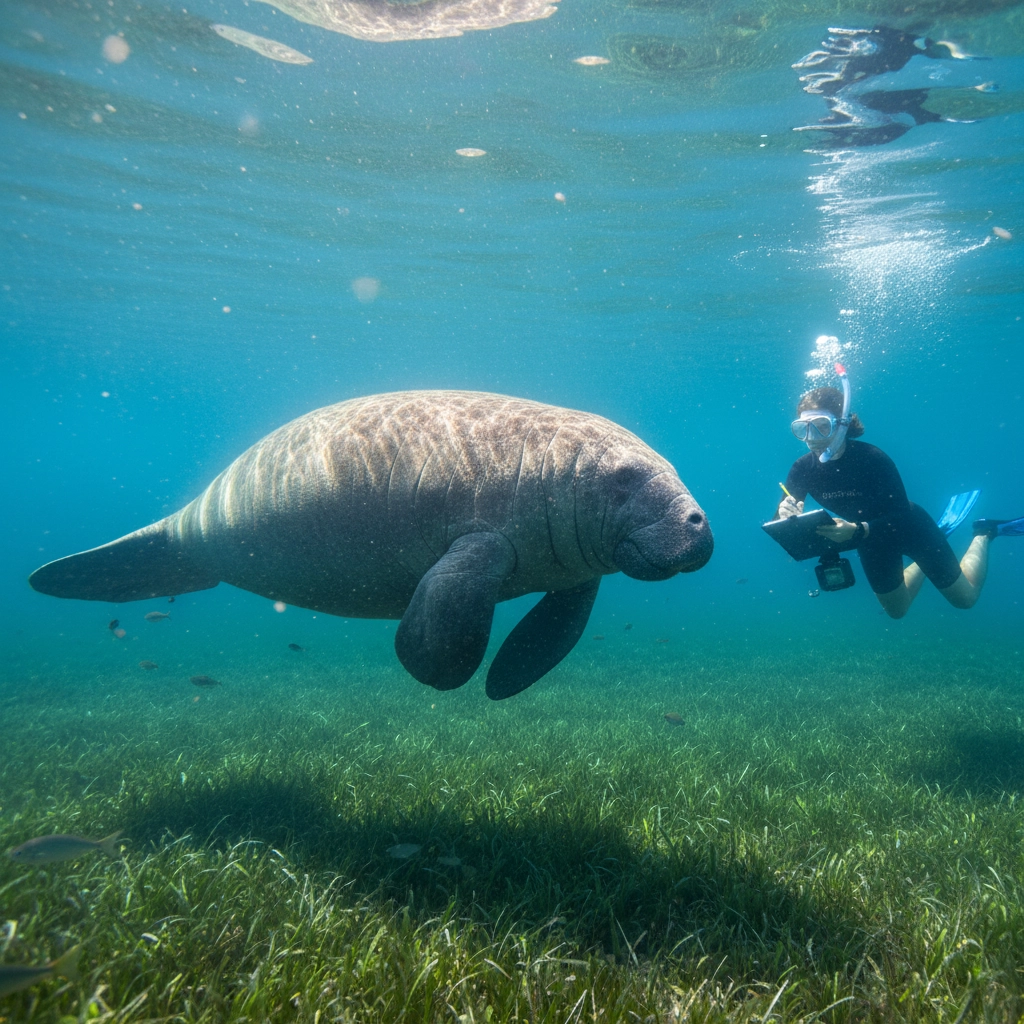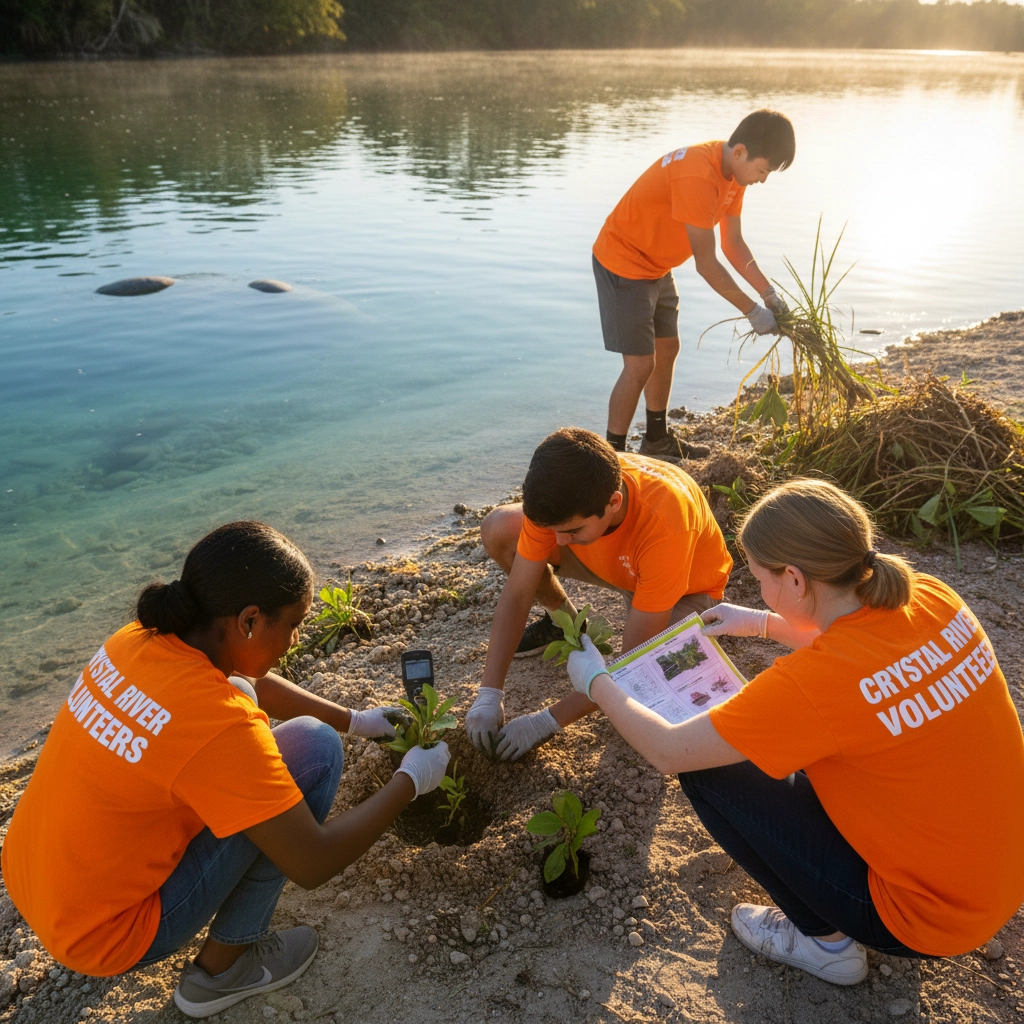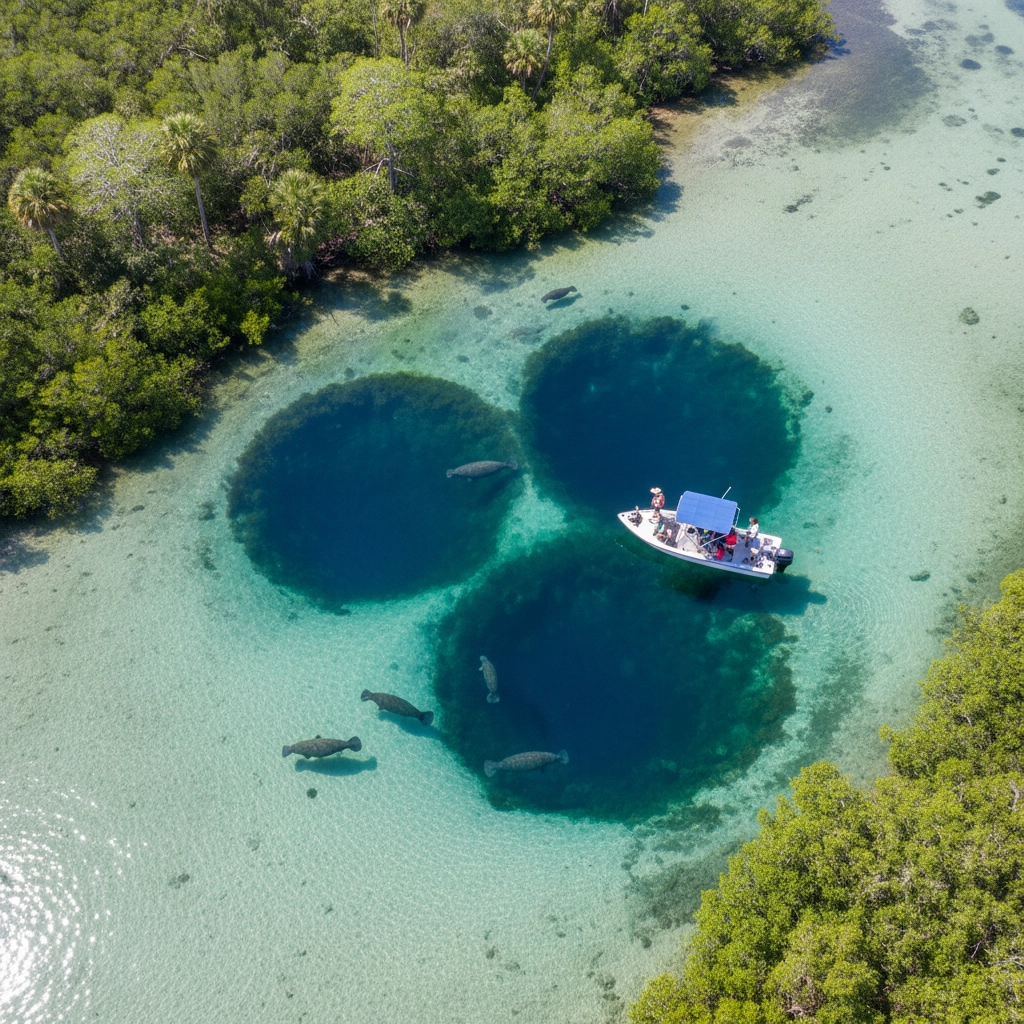The Future of Florida's Manatees: Inspiring the Next Generation of Marine Scientists
- Caleb Mullenix
- Oct 27, 2025
- 6 min read
Ensuring the survival of Florida's manatees while cultivating the next generation of marine scientists represents one of the most critical educational missions facing our coastal communities today. The convergence of urgent conservation needs and exceptional learning opportunities in Crystal River creates an unprecedented platform for transforming students into active environmental stewards and future marine researchers.
Understanding the Current Crisis Through Scientific Inquiry
The Florida manatee population faces mounting challenges that provide real-world case studies for student researchers. In 2025 alone, 477 manatees have died in Florida waters: exceeding mortality rates from both 2024 and 2023. This alarming trend continues a devastating pattern that began in 2021 when over 1,000 manatees perished in the Indian River Lagoon due to seagrass loss caused by nutrient pollution.
Students engaging with manatee research gain firsthand experience with population dynamics, environmental impact assessment, and conservation biology. The Indian River Lagoon's loss of over 90% of its seagrass biomass serves as a powerful demonstration of ecosystem collapse and recovery potential. These real-world scenarios provide students with authentic research questions: What factors contribute to seagrass decline? How do water quality parameters affect manatee survival? What restoration methods show the greatest promise for habitat recovery?
Crystal River's relatively stable manatee population offers a contrasting case study, allowing students to examine the conditions that support successful conservation outcomes. The warm-water springs that attract manatees during winter months create natural laboratories where students can observe animal behavior, monitor water temperature fluctuations, and document seasonal migration patterns.

Career Pathways in Marine Mammal Science
The field of marine mammal research offers diverse career opportunities that students can explore through hands-on experiences with manatee conservation. Marine biologists specializing in sirenian research conduct population surveys, analyze genetic samples, and track individual animals using photo-identification techniques. Students participating in these activities gain exposure to scientific methodologies while contributing to ongoing research databases.
Veterinary marine science represents another critical career path, particularly relevant given current manatee mortality events. Students can observe rescue and rehabilitation procedures, learn about marine mammal anatomy and physiology, and understand the complex medical challenges facing wild populations. The Florida Fish and Wildlife Conservation Commission's manatee rescue network provides opportunities for students to witness conservation medicine in action.
Environmental policy and management careers become tangible through student engagement with habitat protection initiatives. The recent expansion of critical manatee habitat to 1.9 million acres demonstrates how scientific research translates into regulatory action. Students can examine the intersection of science and policy, understanding how research findings influence conservation strategies and regulatory decisions.
Water quality monitoring and environmental consulting represent growing fields where students can make immediate contributions. The ongoing challenges with nutrient pollution in Florida's waterways require continuous monitoring and assessment. Students trained in water quality testing, aquatic plant identification, and ecosystem assessment develop marketable skills while addressing real environmental problems.
Hands-On Research Opportunities in Crystal River
Crystal River provides exceptional opportunities for student-led research projects that contribute meaningful data to ongoing conservation efforts. The area's unique spring-fed ecosystem supports year-round research activities, from winter manatee aggregation studies to summer seagrass monitoring programs.
Students can participate in citizen science initiatives that complement professional research efforts. Photo-identification projects allow students to build databases of individual manatees, tracking their movements, behavior patterns, and health status over time. These long-term datasets become valuable resources for population studies and behavioral research.
Water quality monitoring programs engage students in collecting temperature, dissolved oxygen, pH, and nutrient data from spring vents and adjacent waters. Students learn to use professional-grade equipment while contributing to databases that inform conservation management decisions. The correlation between spring discharge rates and manatee aggregation patterns provides students with opportunities to analyze complex environmental relationships.
Seagrass mapping and monitoring projects teach students botanical identification skills while documenting critical habitat conditions. Students can establish permanent monitoring transects, photograph changes over time, and quantify seagrass coverage and species diversity. These activities connect students directly with habitat conservation efforts while developing scientific observation and documentation skills.

Service Learning Through Conservation Action
Service learning opportunities in Crystal River transform students from passive observers into active conservation participants. Habitat restoration projects allow students to plant native vegetation, remove invasive species, and create buffers that protect water quality. These hands-on activities demonstrate the direct connection between human action and environmental outcomes.
Educational outreach programs enable students to share their knowledge with younger learners and community members. Students can develop and deliver presentations about manatee biology, create educational materials for visitor centers, and serve as junior interpreters during public programs. These experiences develop communication skills while reinforcing scientific understanding through teaching.
Pollution prevention initiatives engage students in community action projects. Students can organize shoreline cleanups, storm drain marking programs, and fertilizer reduction campaigns. These activities address direct threats to manatee habitat while empowering students to lead environmental change in their communities.
Data collection and analysis projects provide students with authentic research experiences while supporting professional conservation efforts. Students can assist with boat-based surveys, underwater vegetation assessments, and behavioral observation studies. The data they collect contributes to peer-reviewed publications and management reports, giving students genuine scientific authorship opportunities.
Crystal River as a Living Laboratory
The Crystal River ecosystem functions as an outdoor classroom where students can observe complex ecological relationships in real time. The spring-fed waters maintain consistent temperatures that support diverse biological communities, from microscopic phytoplankton to large marine mammals. Students can examine energy flow, nutrient cycling, and population dynamics within this relatively contained system.
The seasonal aggregation of manatees in Crystal River provides predictable opportunities for behavioral observations. Students can document feeding behaviors, social interactions, and thermoregulatory strategies. The presence of multiple age classes, including mothers with calves, allows students to observe reproductive behaviors and parental care strategies.
The transition zones between freshwater springs and saltwater environments create opportunities for studying osmoregulation, species distribution patterns, and ecological adaptation. Students can compare plant and animal communities across salinity gradients while examining the physiological challenges facing organisms in these dynamic environments.
Human impact studies become readily apparent in Crystal River, where boat traffic, development pressures, and water use conflicts create ongoing management challenges. Students can examine the effectiveness of manatee protection zones, analyze the relationship between human activity and animal behavior, and evaluate conservation strategies in real-world contexts.

Building Tomorrow's Conservation Leaders
The integration of manatee conservation science with student education creates a pipeline of informed, motivated conservation professionals. Students who engage with these charismatic megafauna develop emotional connections to marine ecosystems that drive lifelong conservation commitments. The combination of scientific rigor and conservation urgency provides students with both technical skills and ethical frameworks for addressing environmental challenges.
Collaborative research projects connecting students with professional scientists model the teamwork essential for effective conservation. Students learn to contribute to larger research initiatives while developing professional networks and mentorship relationships. These connections often lead to research opportunities, internship placements, and career guidance that extends far beyond initial field experiences.
The documentation and communication skills developed through manatee research prepare students for diverse career paths in environmental fields. Whether pursuing marine biology, environmental policy, science education, or conservation medicine, students gain foundational experiences that inform their professional development and career choices.
Ensuring Long-Term Impact
The future of Florida's manatees depends critically on sustaining public support and scientific understanding across generations. Educational programs that engage students in authentic conservation research create informed advocates who understand both the complexity of environmental challenges and the potential for positive change.
Students who participate in manatee conservation research develop sophisticated understanding of ecosystem dynamics, human impacts, and conservation strategies. This knowledge base enables them to make informed decisions as citizens, consumers, and potentially as conservation professionals. The ripple effects of quality environmental education extend far beyond individual career choices to influence community attitudes and policy support.
The establishment of long-term monitoring programs staffed by successive generations of students creates continuity in data collection while providing ongoing educational opportunities. These programs demonstrate that environmental stewardship requires sustained commitment and collaborative effort across multiple generations.
Preparing students for careers in marine conservation ensures that Florida's manatees will benefit from continued scientific attention and advocacy. The current generation of students will inherit responsibility for addressing climate change impacts, population growth pressures, and emerging conservation challenges that will define the future of Florida's marine ecosystems.
The convergence of conservation urgency and educational opportunity in Crystal River provides an unparalleled platform for inspiring the next generation of marine scientists. By engaging students in authentic research experiences and meaningful service learning, we cultivate both the technical expertise and ethical commitment necessary for ensuring the long-term survival of Florida's manatees and the health of marine ecosystems they represent.



Comments